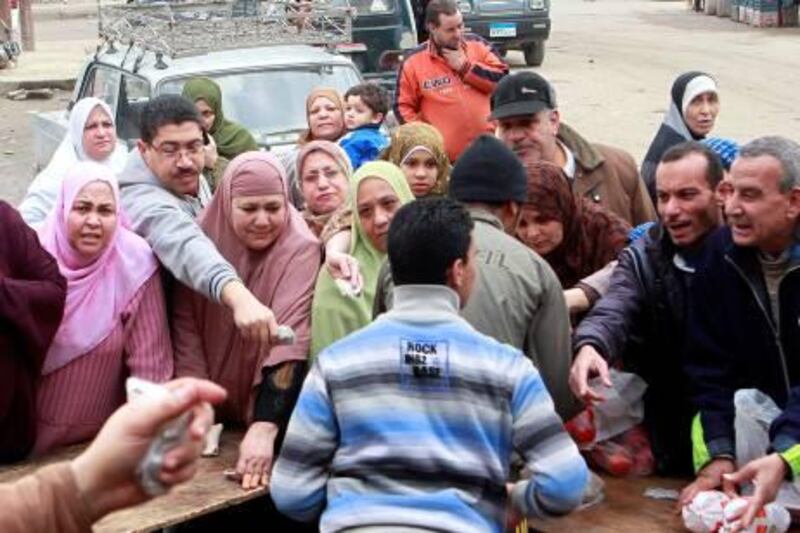CAIRO // Egypt's new parliamentarians will face their first test tomorrow of whether they can work together to help the country revive its economy and wrest control from the generals who have been ruling the country.
Tomorrow's convening of the 508 members of the lower house of parliament will see the announcement of key leadership figures in the new body, which is dominated by Islamist groups that captured the majority in a month and a half of voting that ended earlier this month.
Mohamed Saad Katatni, the secretary general of the Muslim Brotherhood's Freedom and Justice Party, will be appointed speaker of the People's Assembly. Two top deputy positions are expected to be given to representatives of the ultraconservative Al Nour and liberal Al Wafd parties. The heads of parliamentary committees will also be announced in the coming days, officials said.
The Freedom and Justice Party won 47 per cent of the seats in the lower house of parliament, according to final, official results released yesterday. Al Nour won 24 per cent, Al Wafd won about 7 per cent and the liberal alliance Egypt Bloc that includes the Free Egyptians party also won about 7 per cent. Of the 508 seats, only 498 were up for grabs, with the remaining 10 seats appointed by the ruling Supreme Council of the Armed Forces (Scaf).
Nizar Ghurab, an Islamist lawyer and member of parliament for the Al Nour party, said that despite the members' differing views, there is consensus on two issues: security and the economy.
"We must be unified on these issues," he said. "The country can't wait."
The issues are intertwined, analysts say. If unemployment continues to rise from its current rate of 11.9 per cent in the face of low investment and the steep drop in tourism revenues, more protests are likely.
Egypt's foreign-currency reserves have fallen by half to about US$18.1 billion (Dh66.5bn) as of December, leaving the country with only enough to cover two to three months of imports. The government's budget deficit could rise to 11.7 per cent from its current 8.6 per cent, according to a ministerial forecast.
The situation has led the interim rulers to renew talks with the International Monetary Fund over a borrowing programme of $3.2bn, which Scaf had rejected last year. Leaders of the Freedom and Justice Party's economic committee said last week that they were planning to discuss this plan in parliament. They have talked of raising more money by renegotiating more of the country's natural gas contracts, according to Zawya Dow Jones.
Mohamed Abdel Moneim El Sawy, an independent member of parliament, said that it had already been agreed to discuss increasing the minimum wage and curbing corruption.
"In the first meeting, we will discuss the skeleton of the parliament more than anything else," he said. "After that, we plan to discuss anti-corruption laws. You can't enforce these laws when the wages are really low."
Tomorrow's meeting is expected to set the tone for huge protests and gatherings expected for Wednesday, the anniversary of the street protests that forced Hosni Mubarak to resign from the presidency on February 11. Scaf is urging Egyptians to view the day as a national holiday of celebration. However, many youth groups and activists who took part in the 18 days of protests are seeking to reignite revolutionary spirits to take control of the transition from the military.
Mohamed Badie, the head of the Muslim Brotherhood, said during a television interview last week that the parliament would seek more oversight of the military and its budget.
"We say that we respect and appreciate the army, but the military council must be held accountable for any mistakes ... No one is above accountability," Mr Badie said during an appearance on the private Egyptian channel Dream TV, according to Reuters.
To do this, the parliament will need to be granted specific powers in the constitution. One of the first tasks for the lower house will be the creation of a 100-member committee to rewrite the country's founding document.
It is still unclear how the group will be chosen and whether Scaf will be able to appoint its own representatives. Liberal groups have expressed fears that the Islamist groups that control roughly 70 per cent of the Assembly seats will try to enshrine Sharia law.
The Al Nour party, which espouses a hardline, Salafist version of Islam, has said it wanted to strengthen Article 2 of the constitution that says legislation must be based on Sharia principles. One option it has put forward is to change the wording to say that legislation is based on Sharia "rulings", rather than "principles", making Islamic jurisprudence more potent.
More pressing will be how to allocate the balance of powers of the government. Freedom and Justice Party officials have suggested they are seeking to strengthen the parliament's role and divide presidential powers between a president, who will focus on foreign affairs, and a prime minister, who will handle domestic issues. This would put an end to the system that allowed Mr Mubarak near total control of the country.
Still to come are elections for the Shura Council, a largely consultative body with less powers than the People's Assembly, that will see voting begin on January 29 and end by February 22. Presidential elections will start before the end of June, according to current plans, though some groups are pushing for them to take place sooner.





